Surrounded by agricultural fields, 40 km from Yavatmal town, is Borisinh village, among the many in Maharashtra where farmers continue to suffer from pesticide poisoning.
Hiraman Sayam, 45, among the farmers affected by pesticide poisoning in 2017, despairs that his body does not have strength as it did before. “I woke up feeling breathless and restless, which was followed by fits and seizures. My shivering body gradually turned cold. My cousins tied me to a cot using a rope and sari because I was not able to lie still. They carried me to the Akola Bazaar Prathmik Arogya Kendra Hospital, from there I was referred to the Shri Vasantrao Naik Government Medical College and Hospital,” Mr. Sayam recalls.
He had sprayed an insecticide named Polo, based on a seller’s recommendation that it would significantly increase his cotton yield.
“The doctors said he suffered poisoning from pesticide that entered his body through the skin. Seeing that his condition had not improved, I took a loan from people to admit him to a private hospital, which cost us ₹1,16,000, of which ₹50,000 is yet to be repaid,” his wife Archana told The Hindu.
Her husband had lost his appetite, and doctors are unable to say if the constant spells of dizziness, headaches, and body pain would be cured, Ms. Sayam said. “His monthly medical expense is ₹3,000,” she added, showing the medical bills. The couple’s two children have dropped out of school owing to their financial difficulties.
Formerly a homemaker, Ms. Archana Sayam has had to take over the work in their three-acre farm. After all this, the family continues to depend on pesticides.
Mr. Hiraman Sayam’s cousin, Vijay Sayam, also a farmer, said they had been exposed to pesticides from a young age. “Our parents and grandparents were spraying pesticides and insecticides such as Endosulfan and Monocrotophos. Today, there are specific pesticides for every crop, such as Monosil, an insecticide, and Asphalt, a pesticide. They cost between ₹1,000 to ₹2,000 per 2.5 litre jar,” Mr. Vijay Sayam said. He is training his two minor sons in farming, and continues to spray pesticides as he does not know of viable alternatives.
Nothing appears to have changed since 2017
In 2017, reports of pesticide poisoning emerged from Maharashtra, drawing global criticism against India’s pesticide regulation policies. The non-profit Pesticide Action Network (PAN) India, in its 2017 report titled ‘Pesticide poisonings in Yavatmal district in Maharashtra: Untold realities’, highlighted cases of deaths by pesticide poisoning in the area.
In 2017 and 2018, after a large number of cases of pesticide poisoning emerged, the distribution and sale of certain insecticides (Profenophos, Fipronil, Acephate, Difenthiron, and Monochrotophos) was prohibited for 60 days in Akola, Amaravati, Buldhana, Washim, and Yavatmal districts.
The pesticides the Hiraman Sayam family said they used are not yet banned in India, D. Narasimha Reddy, adviser, PAN India, said. “Monocrotophos is extensively used in Maharashtra for white fly, as well as to boost plant growth. It is not licensed for usage on food crops but farmers use it unknowingly. In Yavatmal, Monocrotophos and Polo were named by even a government task force committee in 2017-18. All pesticides are hazardous products, with the potential to cause illness in whoever is in the agricultural fields during and after spraying. Fertilisers also have ammonia and nitrates that can contaminate water sources and soil,” Dr. Reddy, who has been working on the issue for over two decades, said.
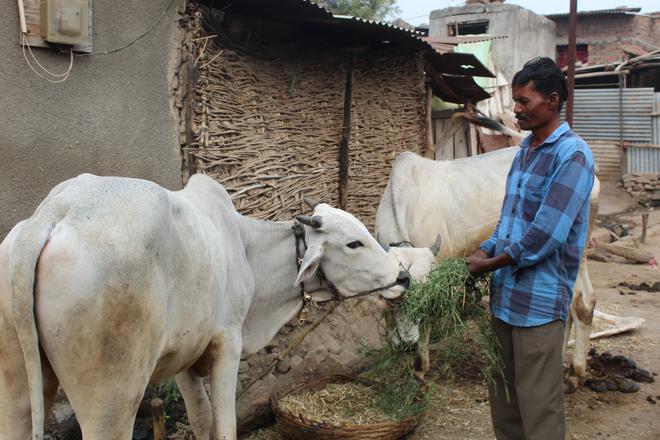
In 2021, PAN International released a list of highly hazardous pesticides, of which over 100 pesticides are currently approved for use in India.
The Maharashtra government introduced a Bill in the Legislative Assembly on August 8, 2023, to amend the Insecticide Act, 1968 in the State. “This is quite a surprise, given that the proposed amendment is very focused, and the problem, which it tries to address, is not new. Through this amendment, the government admits that misbranded or substandard pesticides are being manufactured and sold in the State. Through this Bill, the government is seeking to punish the manufacture and sale of adulterated, non-standard, or misbranded insecticides. The amendment simply wants punishment to be cognisable and non-bailable. We urge the government to address other challenges as well,” Dr. Reddy said.
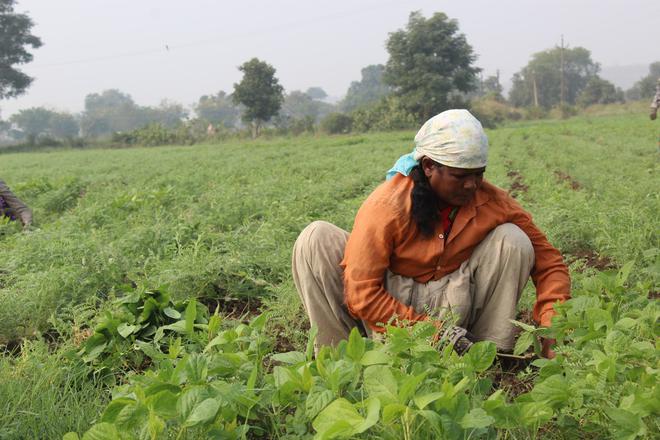
Safia Zameer Mirza, a 43-year-old daily wage earner, has worked in farms since she was a teenager. She lives in the Ghatanji hills, 6 km from Saikheda village, where she goes to work. Farm labourers, including Ms. Mirza, are extremely vulnerable to pesticide poisoning. “I don’t know the names but some of them stink so badly that our clothes smell for weeks even after they are washed with soap. Since we come directly in contact with the sprayed soil, our skin burns, we get rashes and boils, and often feel nauseated. When we raise our concerns, the farm owner asks us to leave,” Ms. Mirza, a mother of three children, said. Her husband also works as a daily wage earner. They earn ₹200 per day for 12 hours of labour.
Goodbye to pesticides
About 20 km from Yavatmal is Subhash Sharma’s 16 acre farm in Tiwasa village. Mr. Sharma, a septuagenarian, stopped using pesticides in 1994.
“In the 1990s, 20 cows died grazing in a farm sprayed with pesticide. This shook me because I was also regularly spraying Phorate (an insecticide), which had an unbearable stink, apart from Monocrotophos, Ekalux (an insecticide), and many others,” Mr. Sharma, who suffered several health issues at the time, said. When he read about legendary Japanese natural farmer Masanobu Fukuoka, he opted to practice only natural farming. “The government should bring stringent laws and ban the manufacture and sale of harmful pesticides,” he added.
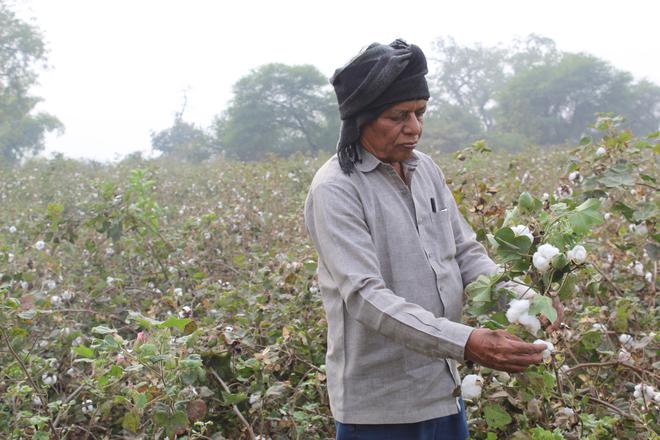
In 2018, the Maharashtra government set up the Dr. Punjabrao Deshmukh Organic Agriculture Mission, named after veteran farmer leader Punjabrao Deshmukh, to promote organic farming. The first phase of the mission was introduced in districts with higher incidence of farmer suicides — Buldahana, Akola, Washim, Amravati, Yavatmal, and Wardha. The Hindu met two farmers who have joined the mission in Saikheda village.
Vilas Bhurke, 60, who owns 10 acres of ancestral land, joined the mission in 2020. “Registered farmers receive training on alternatives to pesticides, including a bacterial culture prepared with buttermilk and jaggery; jeevamrut, a jaggery-based natural fertilizer; cow dung and cow urine; dashparni ark, a natural insecticide made of decomposed leaves and grass,” Mr. Bhurke said.
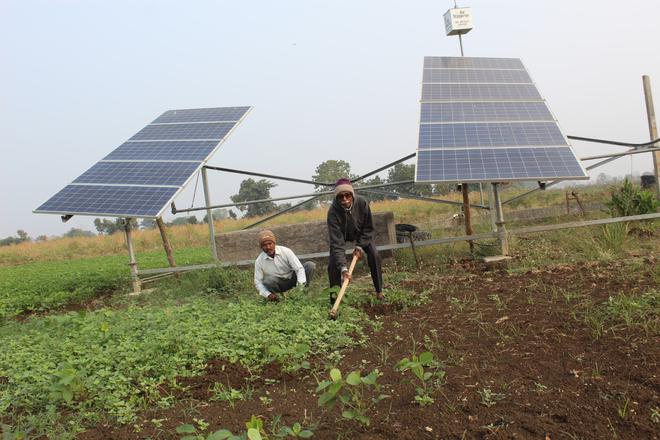
Farmers need quick results, which makes them turn to pesticides, Sandip Khuje, 50, owner of seven acres of land, said. “It takes at least three years to turn the soil culture organic, and after that, farmers don’t have to spend money on pesticides,” Mr. Khuje said.
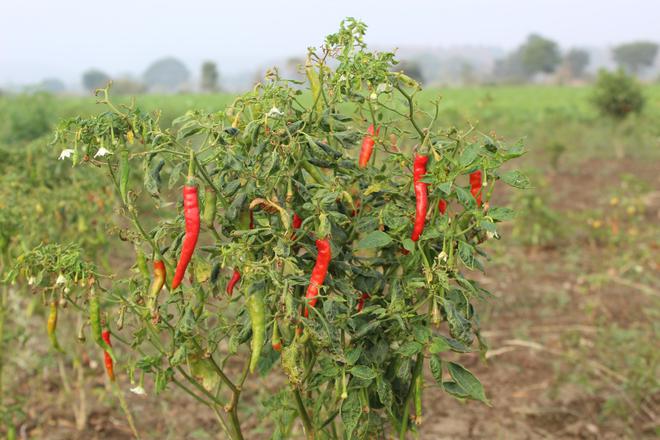
Three years ago, Bhagyawan Dilip Kombe, 27, from Belora village, suffered side effects from pesticide exposure. Mr. Kombe’s grandfather and father had died of pesticide poisoning. “We used to spray Coragen (an insecticide), Roundup (a herbicide) and Monocrotophos, and many others. The seller only says which crop’s production it will boost, but not the health hazards,” Mr. Kombe said. With the help of the non-profit Sarvanath Waghadi Farmer Producer Company Limited (SWFPCL), he learnt how to use organic fertilizers.
Since 1994, SWFPCL has been training farmers in seven districts— Yavatmal, Latur, Osmanabad, Nashik, Akola, Amravati and Buldhana — to adopt organic farming.
Minakshi Sawalkar, director, SWFPCL, said they were currently supporting 300 farmers, but they had a long way to go.
Muralidhar Bhoir, senior field coordinator at the environment conservation non-profit SwitchOn Foundation, said it took some years to achieve success with organic farming. “Farmers are hesitant to adapt to change because they have practised inorganic farming for generations. There could be a 75% loss in the first year they switch to organic. Nobody wants that,” Mr. Bhoir told The Hindu.
Pesticide seller Kailash Vamanrao said it was not possible to make a living from a fully organic fertilizer shop. “Nothing has been banned after the 2017 poisoning cases. We are selling it. Fertilizers and pesticides such as Monosil, Police, Indo Gulf, Super Compound D Fertilizer, DAP, and more, are very harmful to the soil as well as human health. But I sell them because there is no restriction from the government, and this is my business,” Mr. Vamanrao said.
Health officials from the Shri Vasantrao Naik Government Medical College in Yavatmal said that there was no antidote available in the market for most of the pesticide poisoning cases, and victims often died untreated. “We were creating awareness on the dangers of pesticides in Yavatmal district even before the 2017 pesticide poisoning cases erupted. Most of the bottles and jars of pesticides do not even carry a warning sign,” Girish Jatkar, who is associated with the hospital, said.
The hospital declined to share its records on pesticide poisoning with The Hindu.
Those who require assistance for overcoming suicidal thoughts may contact Aasra (022-27546669) or the Vandrevala Foundation (18602662345/18002333330).







